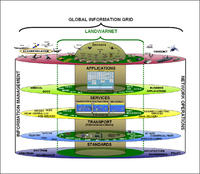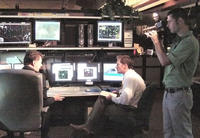-
iPads allow judges to sign warrants anywhere
Getting local judges to sign last minute warrants just got a lot easier with iPads
-
-
Brown graduate students help bankrupt city create disaster plan
To help the cash-stricken city of Central Falls, Rhode Island, thirty graduate students from Brown University have banded together to help create a disaster preparedness plan
-
-
Study shows violence against women increases following disasters
A new study shows that in the aftermath of a devastating natural disaster domestic violence against women tends to increase
-
-
Tornadoes will not deplete FEMA disaster fund
The latest series of tornadoes that raged across the Midwest and South will not deplete the U.S. disaster fund, which was only recently reloaded by Congress last year, officials said
-
-
Tighter regulation of industry’s disaster preparedness required
Before 11 March 2011, Japan was held up as a paragon for preparedness; they had a national readiness plan, regular disaster drills, and strong civic engagement; the Fukushima disaster exposed a disturbing reality: search and rescue efforts were delayed, shelters ill-equipped, and supply chains broken; worst of all, there was confusion about who was managing the nuclear accident — the power company TEPCO or the Japanese government; information, when forthcoming, was sometimes contradictory
-
-
Fukushima lesson: be ready for unanticipated nuclear accidents
A year after the Fukushima disaster all but two of Japan’s fifty-four nuclear reactors remain shut down, in a country where nuclear power once supplied nearly 30 percent of the electricity; the Japanese government is awarding an initial $13 billion in contracts to begin decontamination and rehabilitation of the more than 8,000-square-mile region most exposed to radioactive fallout
-
-
Missouri first responders learn from last year’s tornado season
Drawing on the valuable lessons learned from last year’s record tornado season, emergency officials in the St. Louis area were ready to spring into action immediately after tornadoes swept through the state once again last week
-
-
The future of nuclear energy
While the lessons of the 11 March 2011 Fukushima disaster are being absorbed, the United States is moving forward with nuclear power; for the first time since 1978, the U.S. National Regulatory Commission has approved two new plants; the $14 billion facilities will be built just outside Augusta, Georgia
-
-
Better policies needed to reduce radiation exposure in nuclear accidents
A new study says that offsite policies and plans should be put in place to reduce the exposure of the public to radiation in the event of a nuclear power plant accident
-
-
Infrastructure security, disaster planning “Super map” developed

A U.S. Marine stationed at the Quantico base in Virginia has developed sophisticated mapping software that can give users full situational awareness of their surroundings in real-time; the software is a “super map” taking in a torrent of data streams from emergency dispatch reports to weather forecasts, traffic reports, and security system alerts
-
-
If Japan-like disaster happened in U.S., results would be far worse
An estimated 20,000 people died or are still missing after a massive earthquake-induced tsunami struck Japan on 11 March 2011, yet some 200,000 people were in the inundation zone at the time; experts say that if the same magnitude earthquake and tsunami hits the Pacific Northwest, the death toll will be much higher because of the lack of comparable preparation; that 90 percent rate could be the number of victims, not survivors
-
-
National Weather Service budget cuts threaten poor IT infrastructure

The Obama administration has proposed cutting more than $39 million from the National Weather Service’s (NWS) budget, particularly from its IT department, and critics worry that the cuts could cause the agency’s already crippling infrastructure problems to grow worse
-
-
Infant survivor of Indiana tornadoes dies, death toll rises to 39
The fifteen-month old infant survivor of the twisters that struck Kentucky and Indiana, who had come to represent a symbol of hope, has died; the death toll is now thirty-nine
-
-
Japan questions earthquake forecasts
Following the massive 11 March earthquake and tsunami that rocked Japan, residents and experts there have grown increasingly skeptical of quake forecasts
-
-
New app helps Queensland coordinate volunteers
Researchers from the University of Queensland have developed a new smartphone app to help mobilize and coordinate volunteer efforts during major disasters
-
More headlines
The long view
The Surprising Reasons Floods and Other Disasters Are Deadlier at Night
It’s not just that it’s dark and people are asleep. Urban sprawl, confirmation bias, and other factors can play a role.
Why Flash Flood Warnings Will Continue to Go Unheeded
Experts say local education and community support are key to conveying risk.
